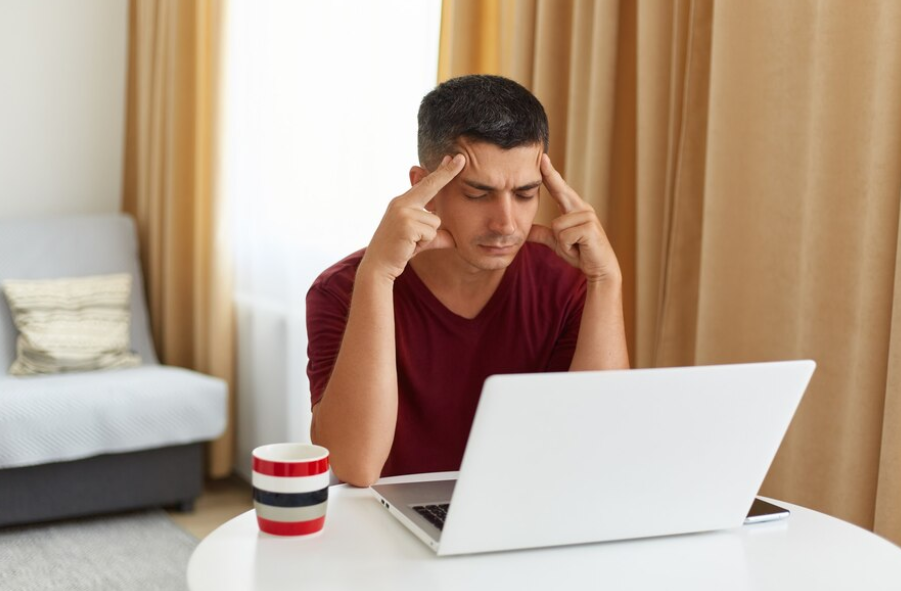Migraine and Neck Pain: Causes, Symptoms, and Easy Remedies
Migraine and neck pain often happen together. This can make daily life hard. Many people feel neck stiffness before or during a migraine. Knowing the link between migraine and neck pain can help manage symptoms better. This article covers the causes, symptoms, and simple home remedies for relief.
The Connection Between Migraine and Neck Pain
Migraine with neck pain and nausea is common. The exact reason is still unclear. Experts believe tension, poor posture, and nerve issues play a role. Neck migraine symptoms include stiffness, throbbing pain, and difficulty moving the neck.
Common Causes of Migraine and Neck Pain
- Tension headaches – Stress tightens neck muscles, causing pain.
- Poor posture – Sitting for long hours without support strains the neck.
- Nerve compression – Pinched nerves in the neck may lead to migraine symptoms.
- Stress and anxiety – Emotional stress can trigger both conditions.
- Sleep problems – Poor sleep can increase migraine attacks and neck pain.
Neck Migraine Symptoms
Early recognition of migraine and neck pain helps in quick treatment. Common symptoms include:
- Throbbing pain on one or both sides of the head
- Stiffness in the neck
- Nausea or vomiting
- Sensitivity to light and sound
- Difficulty moving the neck
- Pain that worsens with movement
If these symptoms occur often, consult a doctor.
Migraine Neck Pain Home Remedies

Simple home remedies can ease migraine and neck pain. These methods are easy and effective.
1. Use a Cold or Warm Compress
- A cold compress reduces swelling and numbs pain.
- A warm compress relaxes stiff neck muscles.
- Apply for 15-20 minutes for relief.
2. Try Neck Stretches and Exercises
- Gentle stretches improve flexibility.
- Roll your shoulders and tilt your head slowly.
- Regular stretching prevents migraine-related pain.
3. Maintain Proper Posture
- Keep your back straight.
- Use an ergonomic chair for support.
- Adjust screens to eye level to prevent strain.
4. Stay Hydrated
- Dehydration can trigger migraines.
- Drink at least 8 glasses of water daily.
- Limit caffeine and alcohol intake.
5. Get Enough Sleep
- Follow a regular sleep schedule.
- Avoid screens before bedtime.
- Use a comfortable pillow for neck support.
6. Use Essential Oils
- Peppermint and lavender oils ease pain.
- Apply a few drops to the temples and neck.
- Inhale for relaxation and relief.
7. Take Over-the-Counter Pain Relievers
- Medicines like ibuprofen or acetaminophen can help.
- Consult a doctor for frequent migraines.
Preventing Migraine and Neck Pain
Lifestyle Changes for Long-Term Relief
- Exercise regularly – Activities like yoga strengthen the neck.
- Manage stress – Meditation and deep breathing help relax muscles.
- Eat a healthy diet – Avoid processed foods that trigger migraines.
- Limit screen time – Take breaks to prevent eye and neck strain.
When to See a Doctor
Seek medical advice if migraine and neck pain are frequent or severe. Visit a doctor if:
- Pain lasts for several days.
- Symptoms get worse despite home treatments.
- You experience dizziness, numbness, or vision issues.
- The pain is sudden and more intense than usual.
Read our Other Articles
Best Pillow for Neck Pain and Migraines
- Choosing the right pillow can help reduce migraine and neck pain.
- A good pillow supports the head and neck to maintain proper spinal alignment.
- Memory foam pillows contour to the shape of your head, reducing pressure points.
- Cervical pillows offer additional neck support, making them ideal for migraine sufferers.
- Cooling pillows help prevent overheating, which can trigger migraine headaches.
- Adjustable pillows allow customization for different sleep positions.
- A firm yet soft pillow prevents the head from sinking too deep, avoiding strain on the neck.
- Pillows made from hypoallergenic materials reduce the risk of allergies, which can worsen migraines.
- Investing in a high-quality pillow improves sleep quality, reducing the chances of waking up with a stiff neck.
Stiff Neck and Migraine with Aura
- A stiff neck and migraine with aura often occur together due to tension and nerve irritation.
- The aura includes visual disturbances like flashing lights, blind spots, or zigzag patterns.
- Muscle stiffness in the neck can trigger nerve compression, worsening migraine symptoms.
- Poor posture, such as slouching or looking down at screens, increases the risk of neck stiffness.
- Dehydration can contribute to both neck pain and migraine attacks.
- Stress and anxiety tighten neck muscles, making migraines more intense.
- Regular stretching and maintaining good posture help prevent a stiff neck from developing.
- Applying heat or cold packs to the neck can reduce tension and improve blood circulation.
How Does Migraine Cause Neck Pain?
- Migraines and neck pain are closely connected due to nerve pathways and muscle tension.
- The trigeminal nerve, which plays a role in migraines, also affects neck sensations.
- Muscle tension builds up in the neck and shoulders, leading to stiffness and discomfort.
- Restricted blood flow during a migraine attack can cause pain in the neck region.
- Inflammation from migraines can spread to surrounding muscles, increasing pain.
- Poor posture, prolonged screen time, and stress can trigger both migraines and neck pain.
- People with chronic migraines often experience neck stiffness before or during an attack.
- Addressing the root cause of migraines can help reduce neck pain as well.

How Do You Get Rid of Neck Pain from Migraines?
- Treating migraine-related neck pain requires a combination of remedies.
- Applying an ice pack can help reduce inflammation and numb the pain.
- Heat therapy, such as a warm compress or hot shower, relaxes tight muscles.
- Gentle neck stretches improve flexibility and relieve tension.
- Practicing good posture reduces strain on the neck and prevents migraines.
- Over-the-counter pain relievers may provide temporary relief.
- Massage therapy can help loosen stiff muscles and improve circulation.
- Staying hydrated prevents dehydration, a common migraine trigger.
- Reducing stress through meditation or deep breathing exercises eases tension.
- Regular exercise improves blood flow and reduces the frequency of migraines and neck pain.
Why Does Coke Help Migraines?
- Some people find that drinking Coca-Cola helps relieve migraine symptoms.
- The caffeine in Coke narrows blood vessels, reducing migraine-related inflammation.
- Caffeine also enhances the effectiveness of pain medications for migraines.
- Low blood sugar can trigger migraines, and Coke provides a quick sugar boost.
- Dehydration can cause migraines, and drinking fluids helps restore balance.
- However, too much caffeine can lead to rebound headaches, making symptoms worse.
- It’s important to limit caffeine intake to avoid dependency and withdrawal headaches.
- While Coke may offer temporary relief, addressing the root cause of migraines is essential.
By understanding the link between migraines and neck pain, you can take steps to manage symptoms effectively. Making lifestyle changes, using the right pillow, and staying hydrated can help reduce discomfort and improve overall well-being.
Frequently Asked Questions (FAQs)
1. Can neck pain cause migraines?
Yes, poor posture, muscle tension, or nerve issues in the neck can lead to migraines.
2. What are the best home remedies for migraine and neck pain?
Cold or warm compresses, neck exercises, staying hydrated, and using essential oils can help ease pain.
External links:
Conclusion
Migraine and neck pain can be tough to deal with, but simple changes can help. Lifestyle adjustments, home remedies, and good posture can reduce pain. If symptoms persist, seek medical attention. Try these tips to feel better and live pain-free!




